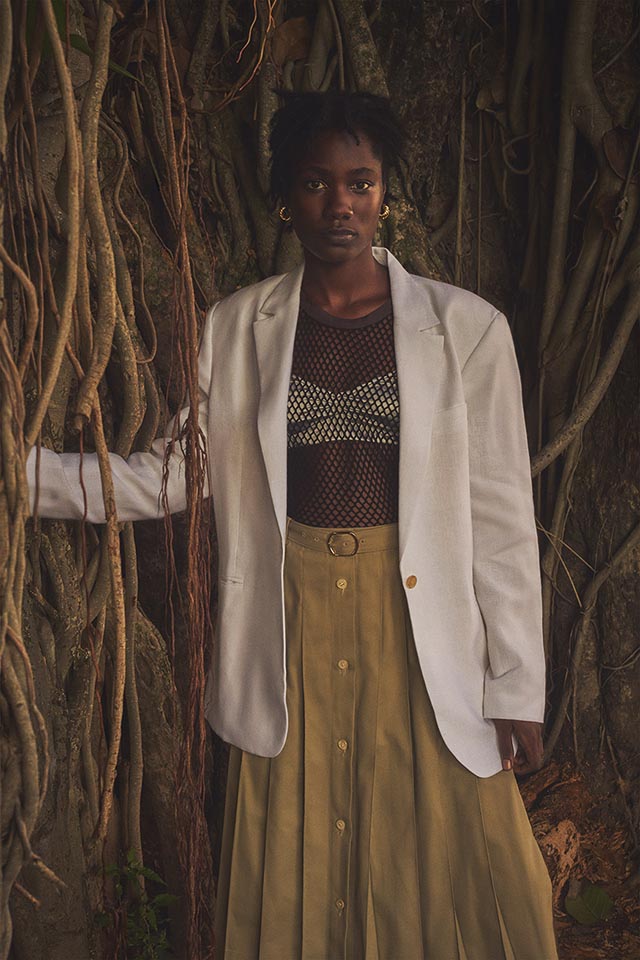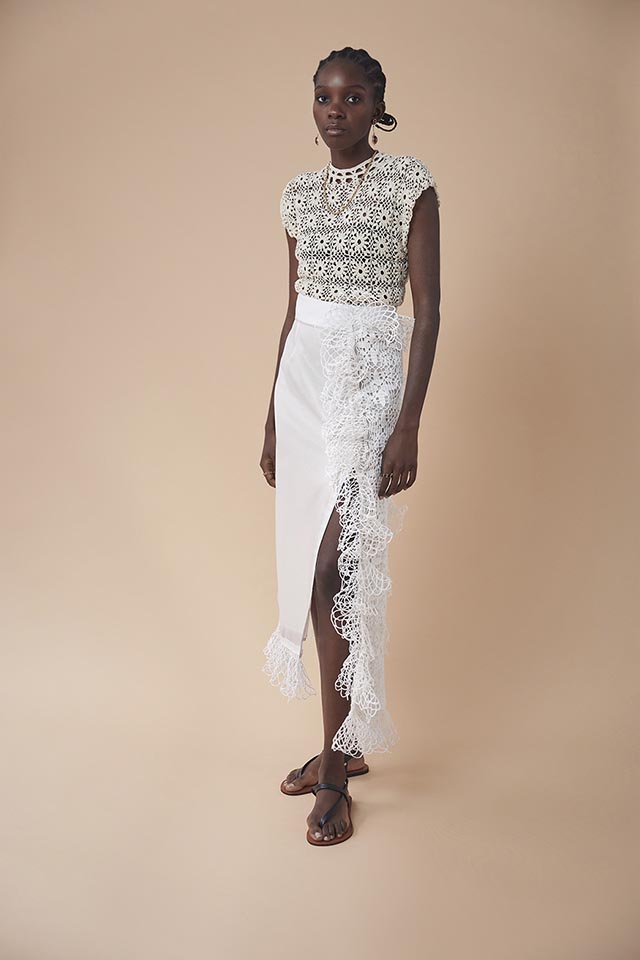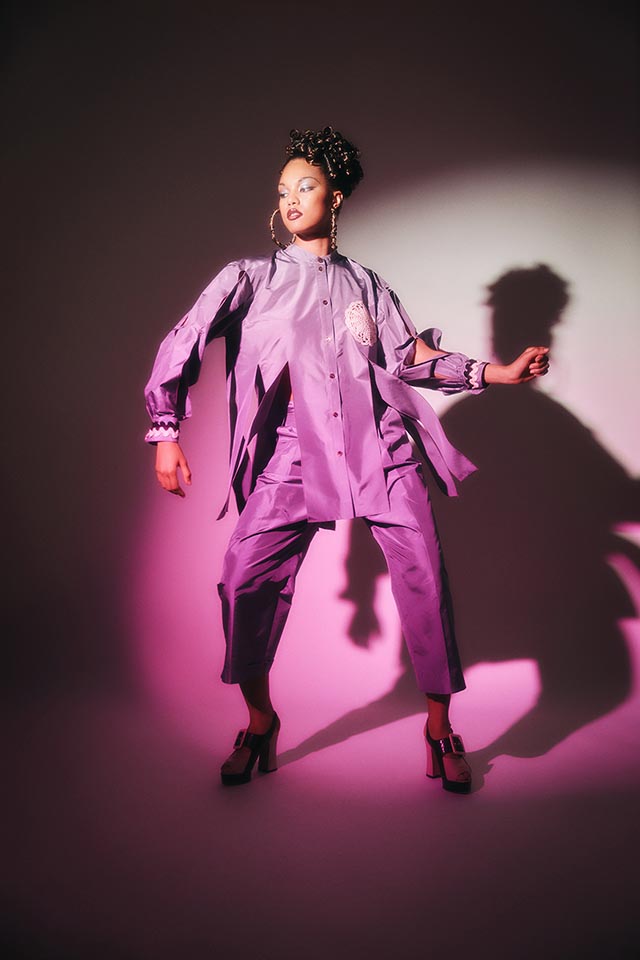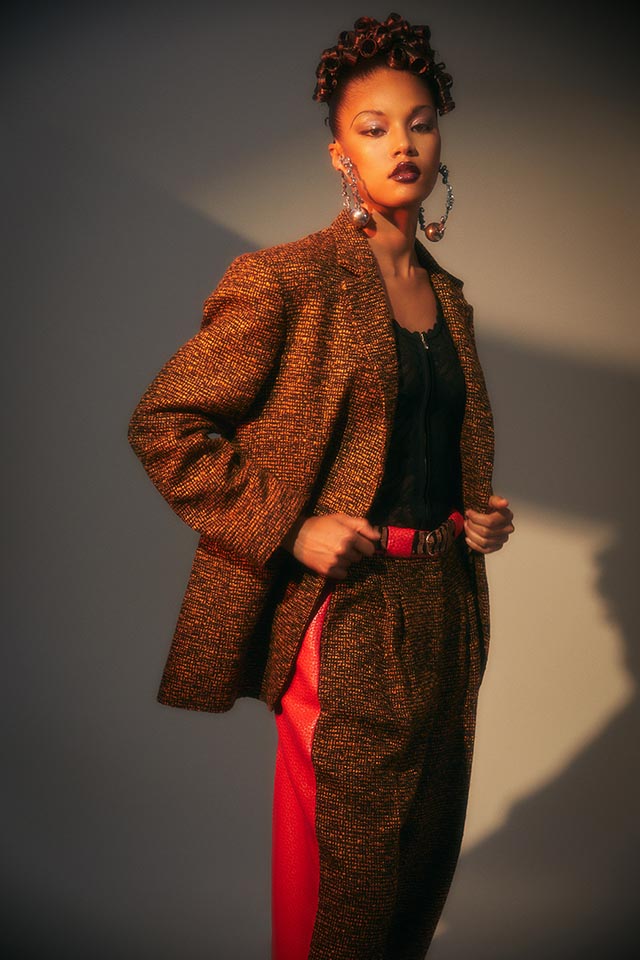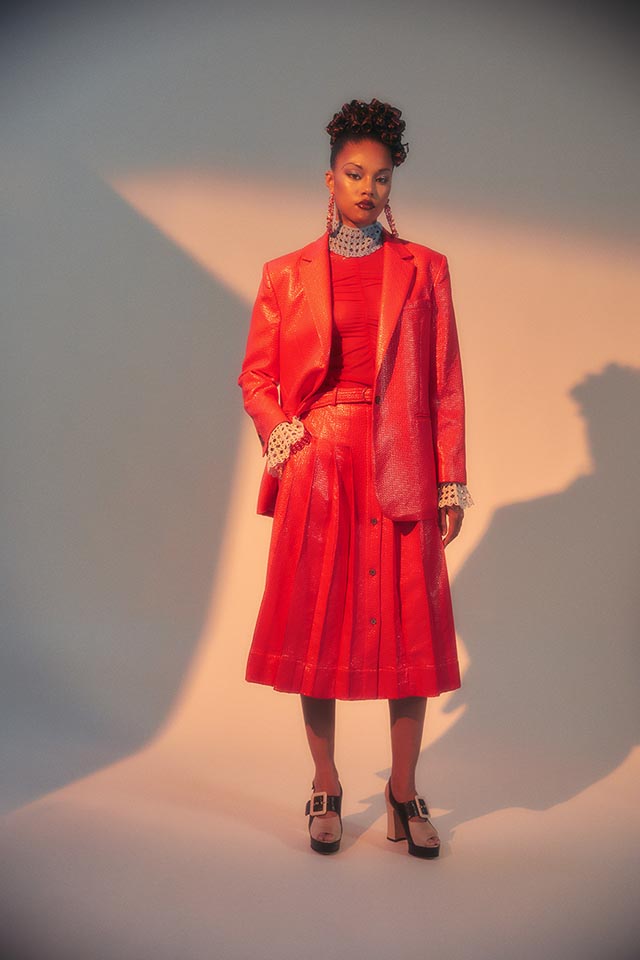In an industry that is notoriously cutthroat, five alumni found their way to the top, navigating the spaces of design, styling, and business to work at some of today’s most exciting brands — or, impressively, launch their own.
Island Style
“I have this weird thing that I do in my life — when something crazy happens, I want to layer on more crazy things,” says designer Rachel Scott ’06, who launched her line, Diotima, during the pandemic, while also serving as the vice president of design at contemporary womenswear label Rachel Comey. “The pandemic gave me a moment of pause to think about where I’m going and what I want out of this career.”
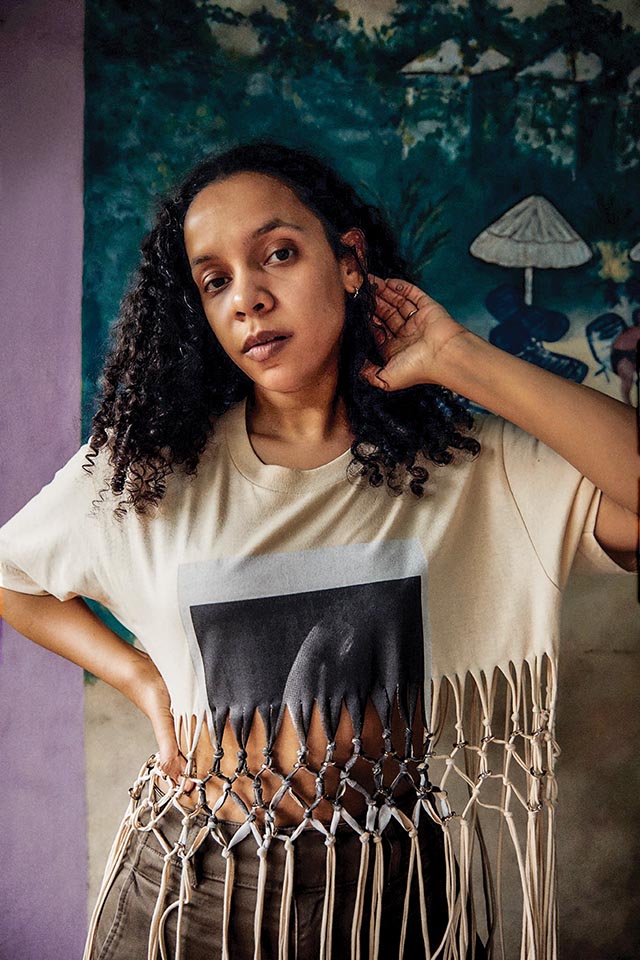
Born and raised in Jamaica, Scott left her home country in 2002 to study art and art history and French at Colgate, all the while planning to pursue a career in fashion design. One summer, she interned at Vogue and took classes at the Fashion Institute of Technology; another summer, she went to London and completed coursework at renowned fashion school Central Saint Martins. “I was always working toward the goal of being a designer,” Scott says.
After graduating from Colgate, Scott realized she needed a more formal foundation in fashion and enrolled in Milan’s famed Istituto Marangoni. While there, she interned — and later became an assistant — at Italian fashion house Costume National. “That was where I learned the most about design, the process, and construction,” recalls Scott.
Scott remained in Milan for four and a half years, at which point visa issues forced her to leave. After moving to New York at the behest of her longtime friend from Colgate, Shinae Lee ’06, she scored an interview at J. Mendel, where she worked as an assistant designer for a little under two years before becoming a designer at Mary-Kate and Ashley Olsen’s line, Elizabeth and James, and, in 2015, a senior designer at Rachel Comey. “All of those places left imprints on how I’d like to work moving forward,” reflects Scott.
For her, that meant bringing her longtime dream of her own fashion brand, one that honored her native culture, to life. “I’ve always had this nagging idea that I couldn’t leave home and not contribute in some way,” says Scott, who tapped local Jamaican artisans to crochet doilies and other textiles to incorporate into Diotima. “It was a combination of wanting to preserve this knowledge of crocheting, which is very specialized, and also wanting to speak about Jamaica and the culture from the perspective of a Jamaican.”
To date, Scott has released two seasonal collections. Both of them feature stunning crocheted creations: think a heart-shaped doily turned into a harness and a skirt featuring a dramatic crocheted ruffle down one side. They also showcase Scott’s take on tailoring inspired by her heritage. “In Jamaica, men used to dress in organza shirts with lace and these enormous drapey pants,” explains the designer. “It was a very unusual way of wearing tailoring that I thought was so cool. Older men in Jamaica still dress this way and I love it.”
Key pieces from her collections include a pleated khaki skirt inspired by the school uniforms Jamaican girls wear, a modernized take on the bush jacket that Scott says Jamaican politicians wore in the late ’70s and early ’80s, and a mesh merino shirt “that every single Jamaican owns if not one of, then multiple.”
Scott intends for her brand to not only emanate the people of Jamaica but also uplift them through job creation and the preservation of their traditional crafts. “What I’m doing is so small, but I’m trying to find a better approach to production by starting from the beginning with labor,” she says. “I’m working with the women in Jamaica, I’m working with mills I’ve known for a long time, that I’ve visited, that I know how they operate.” She continues, “With places like the Caribbean or Africa or South America, ideas are always extracted and represented somewhere else. The product is never from there.” With Diotima, home is where the heart — and handwork — is.
Window Shopping
As a first-year studying political science at Colgate, Matthew Schiff ’05 was approached by Professor Yufan Hao, who taught his East Asian comparative politics class, about an opportunity that would ultimately dictate the trajectory of his career: participating in Hao’s study-abroad group to China. “There was something intriguing and compelling about traveling to China, just as it was starting to really open up on the global stage,” Schiff reflects. To prepare, he took an intensive Mandarin class that summer and another one at Colgate before going abroad in 2003.
Not long after arriving, the SARS outbreak caused the study-abroad program to end prematurely. Schiff returned to Colgate, where he finished out his degree, but he decided to return to China post-graduation, arriving in Shanghai in October 2005. “It was an incredibly interesting city to be in at that time, with a lot of expats and U.S. companies setting up big offices. China was doing, like it still is, so much of the manufacturing for U.S. brands.”
Through networking, Schiff scored a job in Shanghai working as the director of China operations for an import/export business that made home textiles (e.g., sheets and pillows) for an American company and later went on to accept a position at Li & Fung, which he calls “the Goldman Sachs of China sourcing.”
Based out of Hong Kong, Schiff traveled often for work, and in 2011 was sent to New York City for three months to help American boots and leather brand The Frye Company open its first store in SoHo. After a successful launch, Schiff was hired to stay on and oversee a division of the footwear business. In this role, his interest in the e-commerce space was piqued. “At that time, nobody but Zappos really thought you could sell high-end footwear online,” says Schiff, who spearheaded bringing Frye’s business into the digital age.
With no e-commerce experience, Schiff helped them re-platform the website. Along with getting up to speed on the tech and digital marketing skills, he also focused on how to bring the story of Frye’s rich legacy and craftsmanship to consumers online. “Leather is such a sensory product — if you go into a Frye store, it hits you in the face how great the leather smell is, but also the hand feel, whether it’s a smooth grain or a pebble grain,” he says. “I was working with the creative team to figure out how to relay those aspects of the product online.” By partnering with whiskey brands and celebrity musicians, Schiff brought Frye’s outdoorsy, Americana legacy to life.
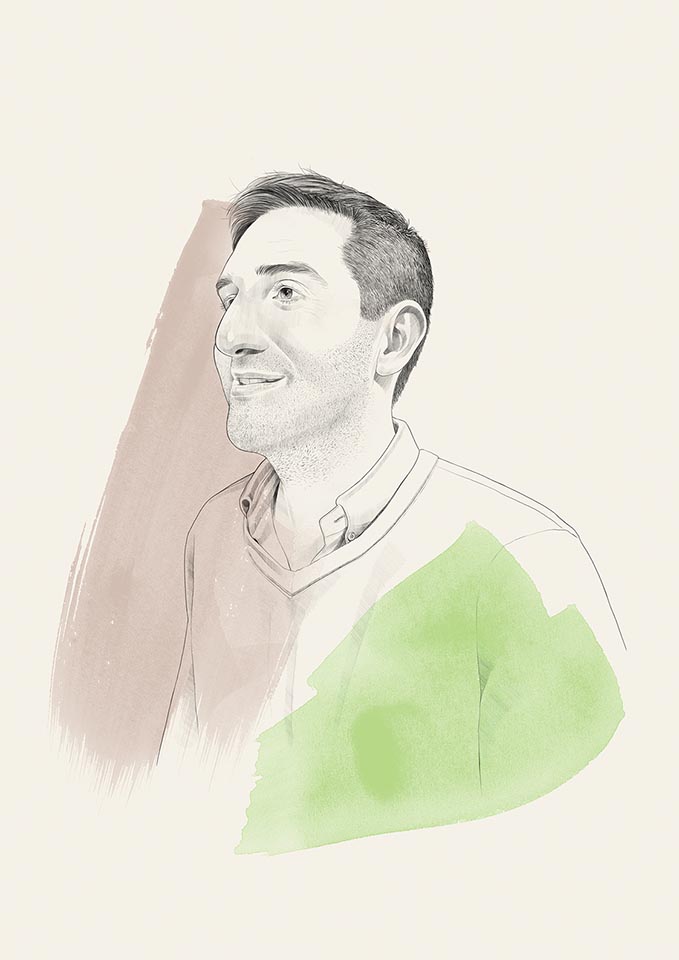
In 2016, Schiff left Frye to work as the chief digital officer for Bendon Group, an apparel company that largely focuses on intimates. It was an expanded role that allowed him to run a larger number of businesses. For two years, he helped navigate the growing marketing and sales opportunities on social media for brands including Frederick’s of Hollywood and Heidi Klum Intimates.
Schiff’s most recent move happened in 2018, when he accepted his current role as vice president, global e-commerce for luxury fashion darling Marc Jacobs, which is owned by LVMH, the largest luxury conglomerate in the world. “I oversee an organization that encompasses technology, merchandising, digital marketing, and all sorts of operations like payment processing and fraud and customer service,” he says, “so it’s putting people and processes together to drive success.” With the start of the pandemic, Schiff’s role became more important than ever, as stores shut down and online shopping was the only commercial channel driving business. “I think we probably got five years of innovation in five months,” he says. “The most rewarding thing is being able to bring together everyone from the creative side of the business, the merchant side, the technology side to make cross-functional ideas come to life and wind up online.”
Reflecting on his time at Colgate, Schiff realizes how invaluable his experience in China, however brief, was: “Fifteen years ago, all China was to the U.S. brands was factories,” he says. “And now, it’s the most important consumer market in the world.” Having lived there, Schiff is able to offer some level of expertise and understanding about the platforms and the customer. “It’s value added as to what I can offer to a business.”
Head Space
If you’re a fan of Fenty or you’ve seen Moulin Rouge! on Broadway, chances are you’ve witnessed the genius work of milliner Sally Caswell ’86. The hatmaker, who also sells her handmade creations through her eponymous website, has both assisted and created for the top names in fashion and theater alike, even lending her honed eye and sculptural skills to exhibitions at the Metropolitan Museum of Art and the Brooklyn Museum. “Everybody needs to have that creative expression in some way,” says Caswell. “Hats do that for me.”
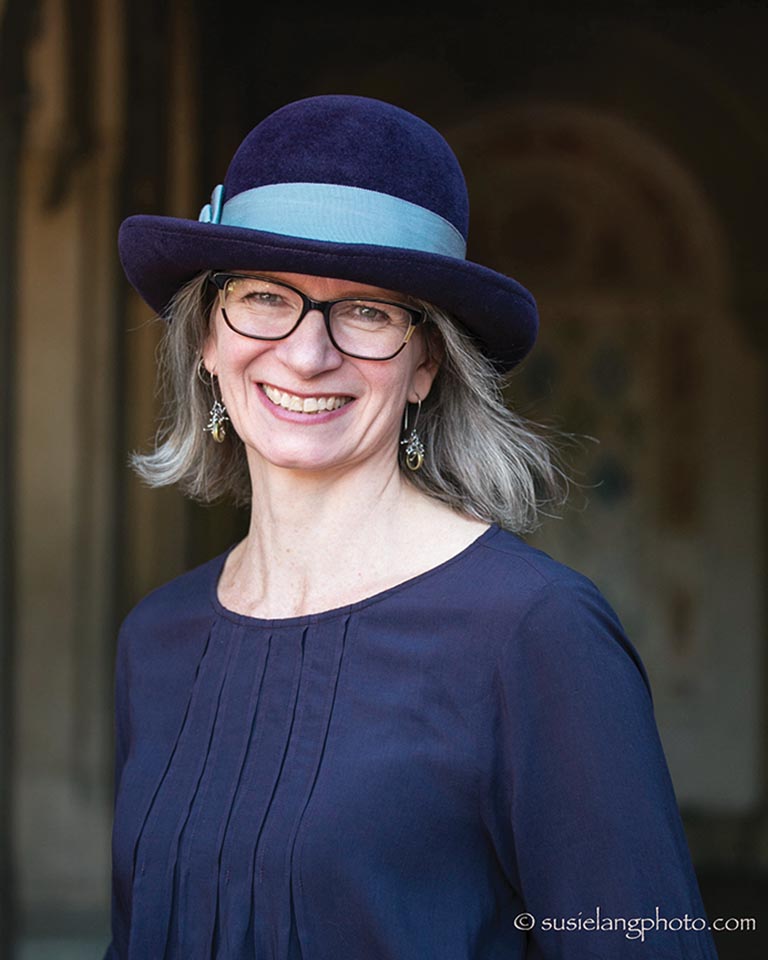
After working odd jobs in New York City post-graduation, Caswell realized she was interested in the arts — not political science, which she had majored in at Colgate. “I’d go to museums in New York and think, ‘This is what I love. I want to learn more,’” she remembers. Caswell returned to school, this time at Hunter College, and received her master’s in art history in 1999. She was promptly hired as an art consultant at a company that restored paintings and evaluated damaged art for private clients.
She worked for them for nearly 20 years before discovering her true passion during her extended six-year maternity leave. “I started a little business making baby slings — there was a market for that at the birthing center I went to,” explains Caswell, whose mother taught her to sew at a young age. Baby slings turned into baby hats, and before she knew it, Caswell was dreaming of designing hats for adults. “[I wanted to make] something more elaborate or something where I’m not worried that my customer’s going to rip their hat off their head and throw it on the ground.”
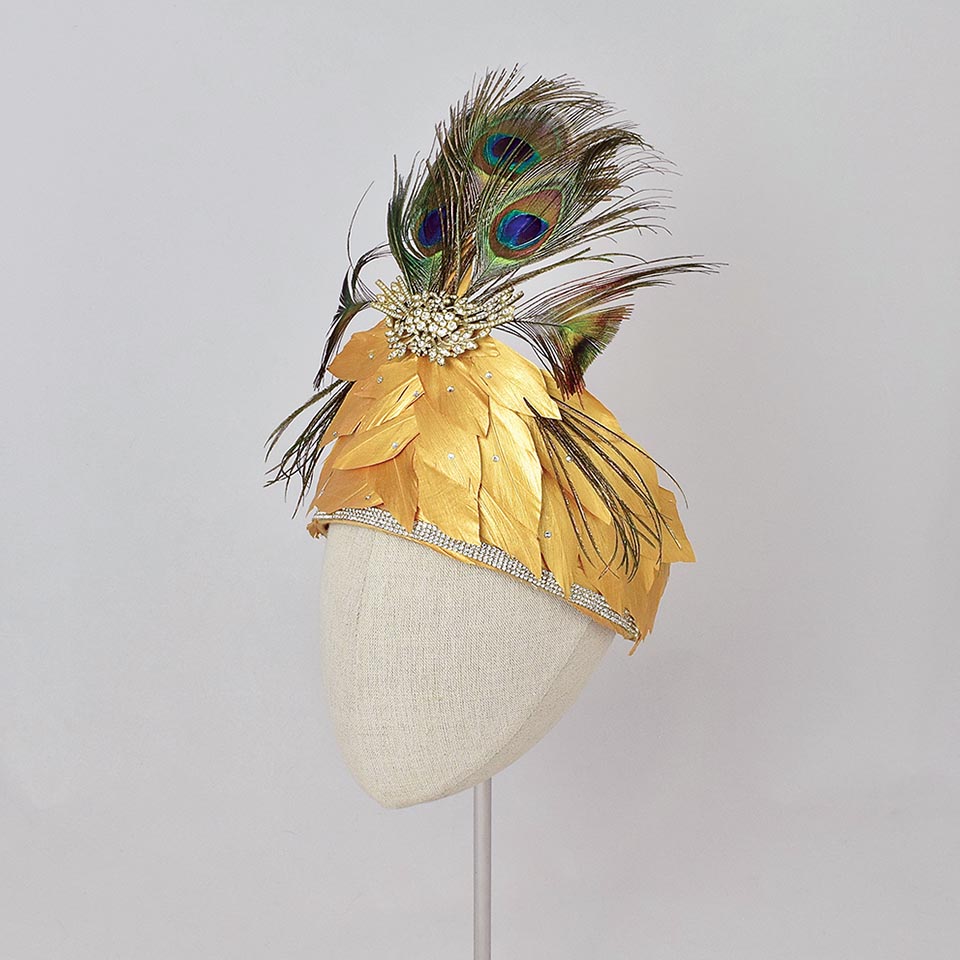
Photography by Susie Lang
She soon enrolled in a millinery class at New York’s Fashion Institute of Technology and, upon graduating, met Linda Pagan, the owner of the SoHo haunt called The Hat Shop. After joining the Milliners Guild, for which she now serves as president, Caswell began bringing her creations to Pagan to review, in hopes of getting them placed in the shop. “I didn’t have a line or anything; I was very nervous,” recalls Caswell, who was making blocked felt hats and other casual styles. Noticing that Pagan was busiest in the spring, during the Kentucky Derby and wedding season, she began making special occasion hats: “It was really fun, and it was a very good market.”
In 2017, not long after the art consulting business closed, Caswell was approached by a fellow Milliners Guild member who asked if she’d be interested in working for theatrical milliner Arnold Levine. “[Theater is] very different from fashion hats,” says Caswell, who accepted the position and still works for Levine part-time. Some of her most notable projects to date include My Fair Lady during its Lincoln Center run; the costumes for Disney Cruise Lines and Royal Caribbean Cruises; and both Frozen and Moulin Rouge — the latter of which recently won the Tony Award for best costume design — on Broadway.
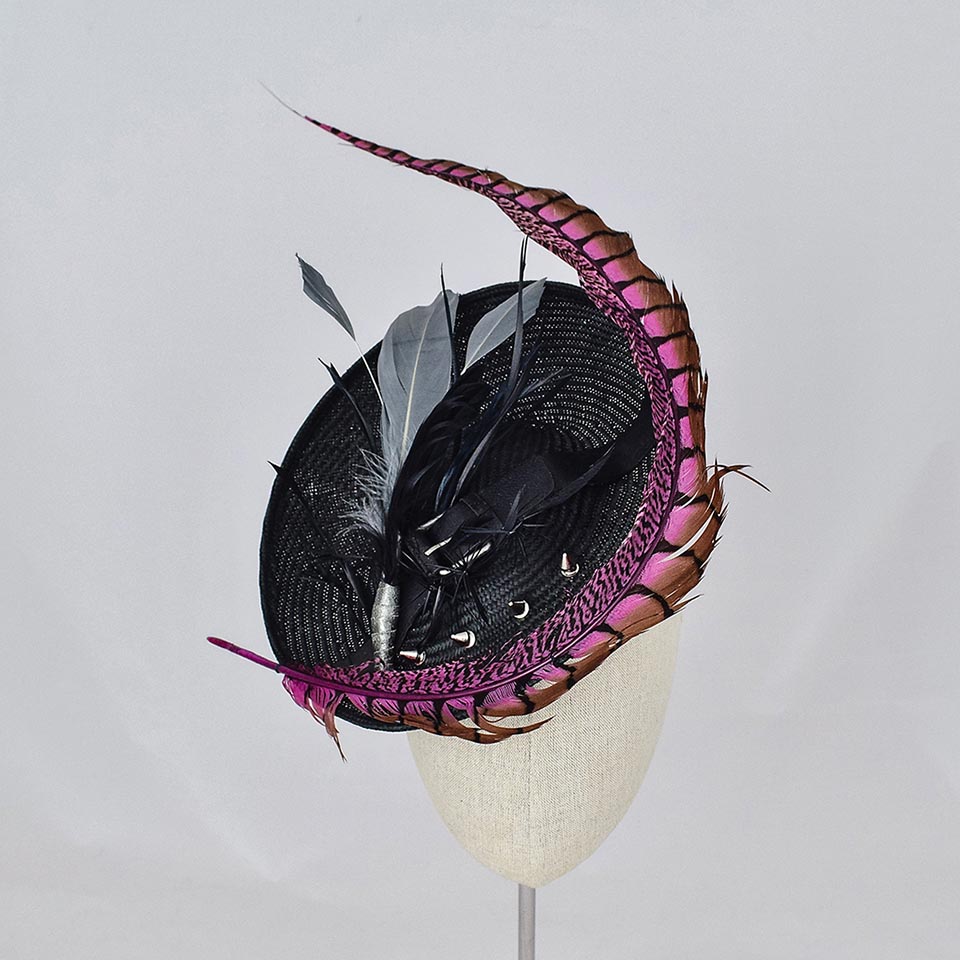
For Caswell, working on fashion hats has always felt more rewarding. So when the opportunity to assist renowned British milliner Stephen Jones, who also happens to be her idol, for New York Fashion Week in September 2019 presented itself, she jumped at the chance. “I wasn’t going to turn down the opportunity to work with him,” says Caswell, who aided Jones in finishing pre-crafted hats and also helped bring newly minted ideas to life.
Together, the two worked on pieces for both Marc Jacobs and Rihanna’s Fenty line. “He has this amazing creative mind where he is always thinking of something new to do, something new to try,” says Caswell, “so there was a lot to make for those shows.” Caswell assisted him a second time, to install the headpieces for In Pursuit of Fashion, an exhibition at the Metropolitan Museum of Art, and again for Fashion Week in February 2020, which, of course, was when COVID-19 brought the world — Fashion Week included — to a screeching halt.
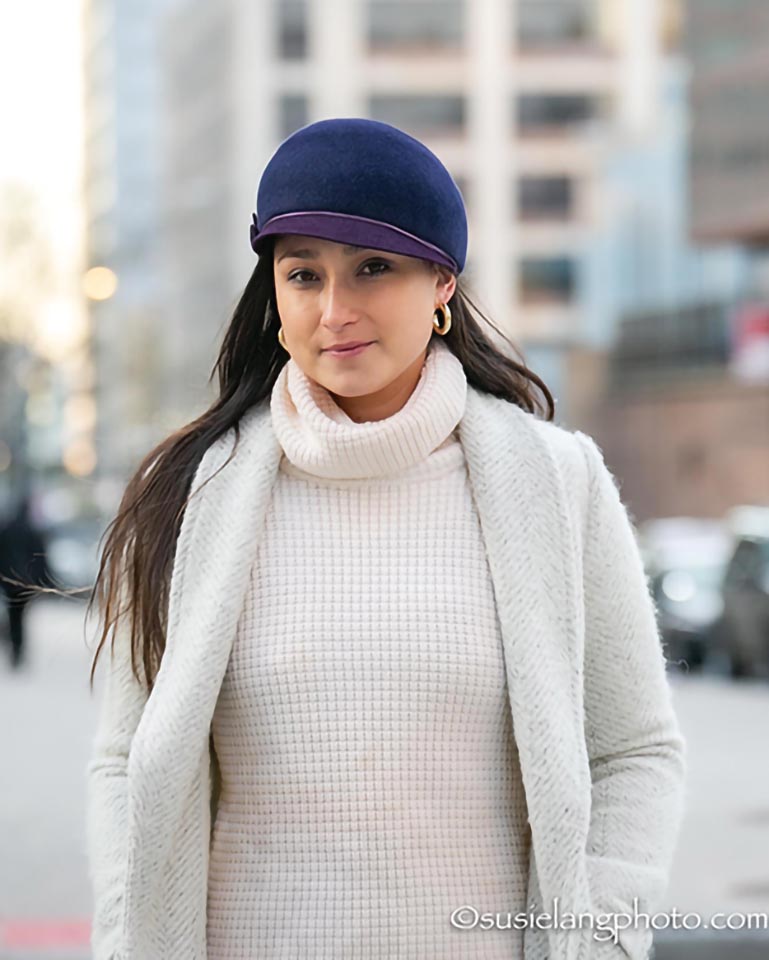
During the pandemic, Caswell was initially largely out of work — Broadway and the performing arts industry as a whole had been turned into a ghost town and no one was buying special occasion hats. “Before the pandemic, I had a website that was more informational. Most of my sales were either through Linda or through word of mouth,” she says. Caswell realized she needed to have an e-commerce site. “I changed over to that and then started promoting more casual things,” she says. “That kept me going.”
Last summer, as the world began reopening, new opportunities cropped up: Jones contacted Caswell and asked if she’d be interested in helping him install the headpieces for the Christian Dior: Designer of Dreams exhibition at the Brooklyn Museum and, shortly after, for In America: A Lexicon of Fashion, the exhibition on which this year’s Met Gala hinged.
As for Caswell’s proprietary hat business? It continues to grow, with an influx of new customers. Current offerings include a chess piece–like winter hat inspired by the Netflix series The Queen’s Gambit, an ephemerally chic powder-blue cloche style, and an asymmetrically rimmed bowler hat with Diane Keaton’s name written all over it.
“There is a hat for everybody, you just have to find the right one,” Caswell says. “If you are going to wear a hat, you have to be prepared because people will look.”
“There is a hat for everybody, you just have to find the right one.”
Sally Caswell ’86, milliner
Crew Team
Katie Crockett ’06 is somewhat of a unicorn within fashion, an industry known for its fickleness.
She’s remained at the same brand, J.Crew, for 15 years since starting as a merchant’s assistant in the men’s department directly post-graduation.
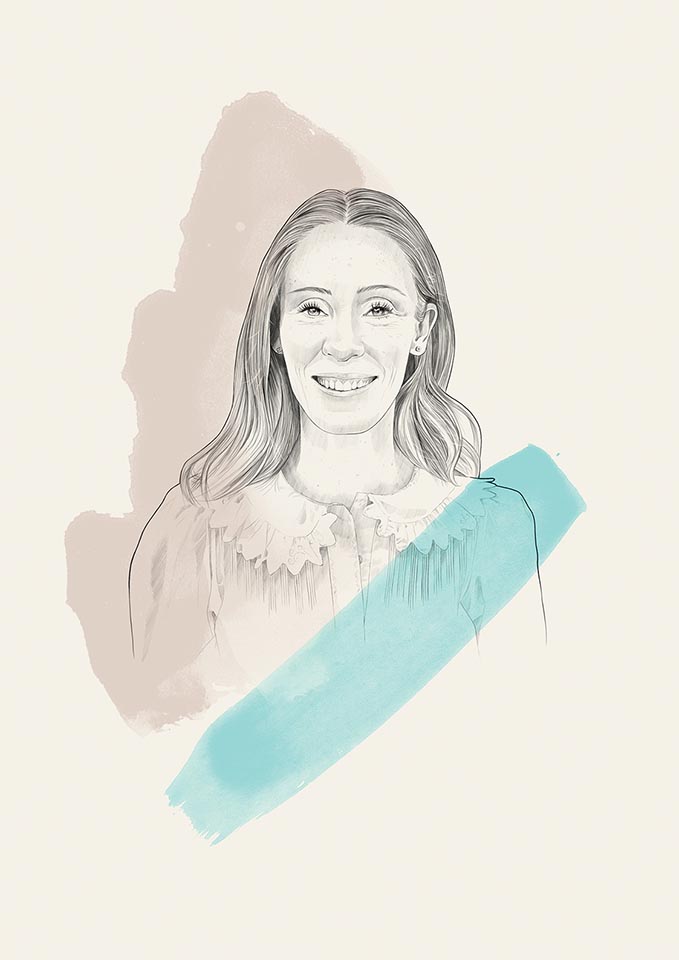
She now holds the title of SVP of merchandising for men’s and Crewcuts, J.Crew’s children’s division. “The company and the industry have changed so much since I started — my job feels very different than it did 15 years ago,” says Crockett, who also notes the company’s inspirational leadership when asked how she’s remained motivated. “I feel very invested in the outcome of J.Crew as a company — there’s a lot of opportunity ahead of us.”
In college, Crockett relished leafing through J.Crew’s magazine mailers. So when a classmate, Kate Christian ’06, hooked her up with an interview, she jumped at the chance. “It was this classic brand, but it also was doing something interesting in the market,” she says, noting that, while it was a contemporary retailer, it always felt a notch above the rest.
As Crockett climbed the ladder, she entered into the women’s apparel space, but in spring 2018, she returned to her roots when she was promoted to VP of merchandising for men’s and Crewcuts. “It was so amazing to make this move because every division has its nuances,” says Crockett. “I’ve been able to sharpen a lot of different skills being on the men’s side, because the businesses run a bit differently and the products have different life cycles.” As a mother of three, Crockett also enjoys working in the children’s space. “It’s really rounded out my career to have access to all of these different areas of the company.”
Crockett was promoted to SVP of her division in April 2019, just one year before the pandemic would force her to adjust to a completely new modus operandi. When offices closed, working from home brought a host of unprecedented challenges to a role so dependent upon seeing physical product. “I would’ve never in a million years thought that I could do my jobs in a remote setting,” says Crockett. “We were shipping fabric samples to designers’ and fabric buyers’ homes so they could see them in the flesh and be like, ‘I think we were right with this; I’ll hold it up to the camera screen.’” Adding fuel to the fire, J.Crew, like so many other retailers, was forced to file for bankruptcy early on in the pandemic. “We emerged from that stronger than ever,” she says.
While Crockett is back part-time in the office now, supply chain issues will continue to impact her work for the foreseeable future. “Even though the pandemic is slowing [for now], there are a lot of ripple effects that are still greatly affecting the way we do our jobs.”
Old is New
In 2015, c left her retail job at Saks Fifth Avenue’s store in Boca Raton, Fla., to accept a local position as a luxury manager at then-scrappy start-up TheRealReal. Launched in 2011, it’s since grown into the premier reselling platform for mid- to high-end items by brands including Chanel, Dior, and Balenciaga, as well as Rag & Bone, Mother, and Solid & Striped. In her role, Ross was first tasked with going into clients’ homes and reviewing their wardrobes, selecting pieces for consignment, cataloguing and packing them up, and shipping them to the company’s warehouse in New Jersey, after which they’d be listed for sale on therealreal.com. “One of the things I’ve seen in living color is how TheRealReal has changed the way people shop,” says Ross, who has risen to senior group manager. “They buy brands that they know they can resell and put back into the circular economy.”
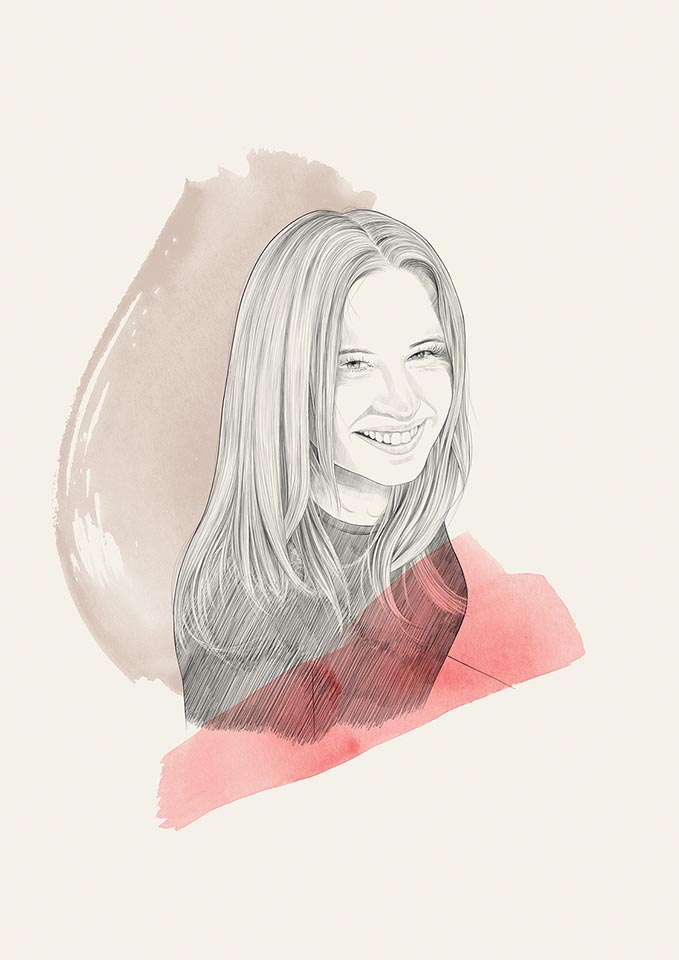
During the pandemic, TheRealReal quickly figured out how to shift its in-person concierge consignment service to online, conducting appointments via Google Hangouts and FaceTime. “We were promoting a lot of supply and sales through statement earrings and statement tops and things that you would see on camera,” says Ross. Whether it’s the uberwealthy hunting down a specific vintage item or younger or less affluent consumers looking for a way to access the luxury market, TheRealReal has a solid stream of self-fulfilling clientele.
Because of its commitment to their three R’s — Resell, Revive, Reimagine — the company has been widely lauded for its somewhat sustainable practices. “One of the biggest accomplishments TheRealReal has made is bringing awareness to the importance of reducing the fashion industry’s carbon footprint in order to save the environment,” says Ross. “I love that I’m part of this movement.”
Although Ross had always wanted to work in fashion, she accepted various positions in public relations out of college that saw her move to Washington, D.C., Boston, and, finally, Boca Raton, Fla., where she still lives. It was there, after the birth of her second child, where she decided to pivot and make a career in fashion happen.
Alongside her friend, Ross launched an Etcetera business, where she would sell clothing and accessories by the namesake brand to private clients by appointment. “We got collections four times a year and we turned one of our two homes into boutique showrooms for a week,” explains Ross. “Boca is a super social, charitable town, so there were a lot of events going on and we would also style people for them.”
In 2012, Ross ascended to the next echelon of the fashion industry, working at Saks Fifth Avenue as the Fifth Avenue Club director at the retailer’s flagship store in Boca Raton. Ross managed a team of the store’s top stylists, who would work with private clients off the selling floor and pull collections and pieces for them to view and try on. “It was a personalized styling service for the top elite clientele of the store,” says Ross. She also coordinated major events for heavyweight designers like Stella McCartney and Roberto Cavalli, who would present runway shows with their newest collections both at the store and at various off-site locations. “It was front-row exposure to some of the most amazing designers and their collections,” recalls Ross.
“It was a magical time.”
Kristen Ross
Still, Ross didn’t want to stay in retail; she had two kids, and holiday vacation wasn’t guaranteed. So when TheRealReal entered into a partnership with Saks, introducing Ross to the start-up, she quickly applied. “The universe was putting me on the right path.”
Dress to Impress on Campus with Hami-Down
Colgate’s bucolic location paves the way for a strong sense of community on campus. But, when it comes to shopping, many students find themselves missing out on the benefits of living in an urban area, like trips to the mall or high-end thrift stores. Though online shopping can provide a temporary fix, the packaging and transportation are not sustainable. So, Cameron Stokes ’23 and Leigh Frankel ’23 took the initiative to start Hami-Down, an online platform for students to sell pre-owned clothes to each other.
“It provides students with a way to make money while also reducing their carbon footprint because they are reducing waste from shipping and returning items,” says Frankel.
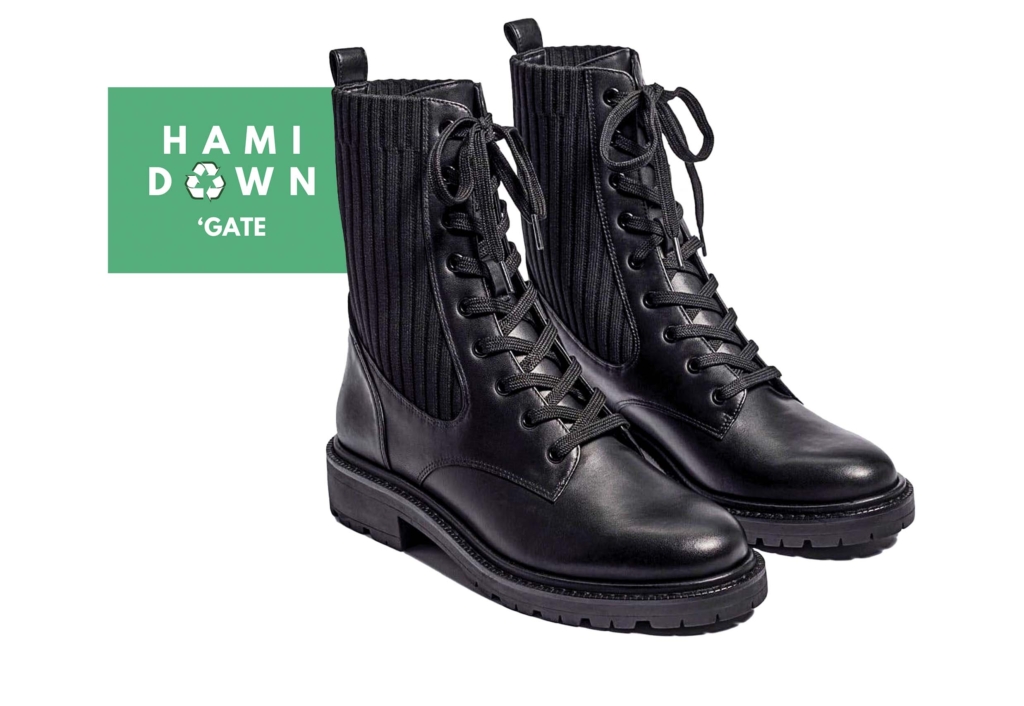
The entrepreneurial duo developed the platform through Thought Into Action, which they joined in fall 2020. They launched Hami-Down in spring 2021 after just one semester of working with their mentors.
The business is run through Instagram (@hamidown_gate), allowing students to submit their items to sell as well as browse available items for purchase. With 850 followers, Hami-Down has reached 25% of Colgate’s student population in just over one semester, and has sold 143 items.
“The success of Hami-Down is more than what we could have imagined, and we have loved connecting with more of the Colgate community in the process of running the business,” Stokes says.
Students can buy a wide range of items: semi-formal dresses that sell anywhere from $30 to $50, just in time for dates or parties; a pair of new L.L. Bean shearling snow boots for $170; a black suede mini-skirt for $20. If students are not looking for new additions to their closets, Hami-Down also sells dorm essentials such as string lights, an air mattress, a printer, and even a Keurig coffee machine. If shoppers can’t find what they’re looking for, Hami-Down often updates with multiple items per day on Instagram.
The popular business shows no signs of slowing down. Stokes and Frankel are dedicated to the growth of their endeavor and are working to ensure its presence on campus for years to come. Currently, they are devoting time to training two other students who will take over the business when they graduate. The clothing exchange group also has partnered with the Office of Sustainability to promote earth-friendly consumption and reach more students for in-person clothing swaps.
Stokes and Frankel both expressed their passion for fashion, but they prioritize their dedication to making a positive impact on the earth and the community.
“I definitely love fashion, and it was one of the motivating factors in creating Hami-Down,” Stokes says. “However, Hami-Down is mostly about efficiency and sustainability.”
— Tess Dunkel ’24

